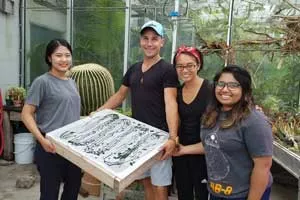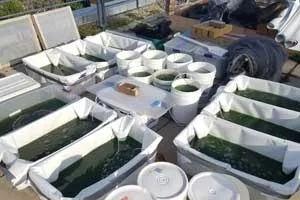
Going for Green: UTM prof's secret ingredient for solving malnutrition
A new project by David McMillen, an associate professor of cell and systems biology at U of T Mississauga, may be the secret ingredient to solving malnutrition issues in the Philippines. Poor nutrition is a fact of life in the country, where nearly half of all households don’t consume enough protein, and about 35 per cent children under the age of five suffer from anemia.
McMillen been awarded a $100,000 grant to investigate solutions to the problem. His project, developed with U of T’s Impact Centre, aims to combine instant ramen—a cheap and popular food staple in the Philippines—with a tiny nutritional powerhouse—spirulna.
“Ramen is very high in carbs, fat and salt, and low in protein and other nutrients, like iron,” McMillen says. “That’s especially true of the cheapest brands—the ones that the poorest people in the Philippines can afford.”
According to McMillen, the dish’s nutrient value could be drastically boosted with a sprinkle of dried spirulina. The tiny green algae has long been a favourite of health nuts and is cultivated in many places for easy-to-produce nutrition, but is not yet grown in the Philippines. Boasting 60 to 79 per cent protein, spirulina contains high levels of vitamins A, B12 and K, and provides a source of iron that is easily absorbed by humans.

Funding for the project comes from a $100,000 grant from Grand Challenges Canada, a nonprofit organization supported by the federal government through Global Affairs Canada. Through the Stars in Global Health program, Global Challenges awarded $2-million in funding for 20 projects by researchers developing solutions to critical health and development challenges in the developing world. Grand Challenges has funded 800 innovations in 80 countries that they estimate have the potential to save up to one-million lives and improve 28 million lives by 2030.
Over the summer, McMillen’s team cultivated buckets of green algae on the rooftop of the Earth Sciences Centre on the St. George campus where they experimented with stirring frequency, light exposure and harvesting techniques. “The growth rate varies with temperature, light exposure, and amount of stirring, but generally the cells can double in about a day or two,” McMillen says. The algae is grown in progressively larger containers, rainging in size from 1 lite to 1000 litres. “Getting a mid-sized pond of a few hundred litres up to steady state growing conditions would take something like a week or two.”
Next the team will work with Filipino partners to set up a cooperative-style business pilot project. Run by local women in the northwestern village of Napsan, the process is designed to integrate into the local lifestyle, emphasizing methods implementable by mothers who are caring for young children. If successful, the model will be expanded to other villages, with the potential to export excess product to external markets and create new economic opportunities for local mothers. “Our goal is to create the means for communities to, in effect, grow their own protein and iron supplements,” McMillen says.
But will the under-five set accept healthy green noodles? “A key part of our project is to integrate algae into the diet in ways that real people can accept,” McMillen says. The project plans to produce packets of dried spirulina to sprinkle over commercially-available ramen, however McMcMillen is also working with a partner to produce spirulina-infused noodles, akin to spinach pasta widely available on North American grocery store shelves. “The good news is that spirulina is actually pretty tasty.” McMillen says, who says that he is a fan of the supplement which he characterizes as “rather pleasant and nutty.” Just don’t add too much of it to your spaghetti sauce, he cautions. “It can turn from red to black—I speak from experience.”
The endeavor is a side project to McMillen’s main research, which uses synthetic biology to modify cells. “This project has none of that,” he says. “Spirulina already does everything we want, so we’re not modifying it at all. The challenge here is about making growth, harvesting and distribution work in the local context.”
